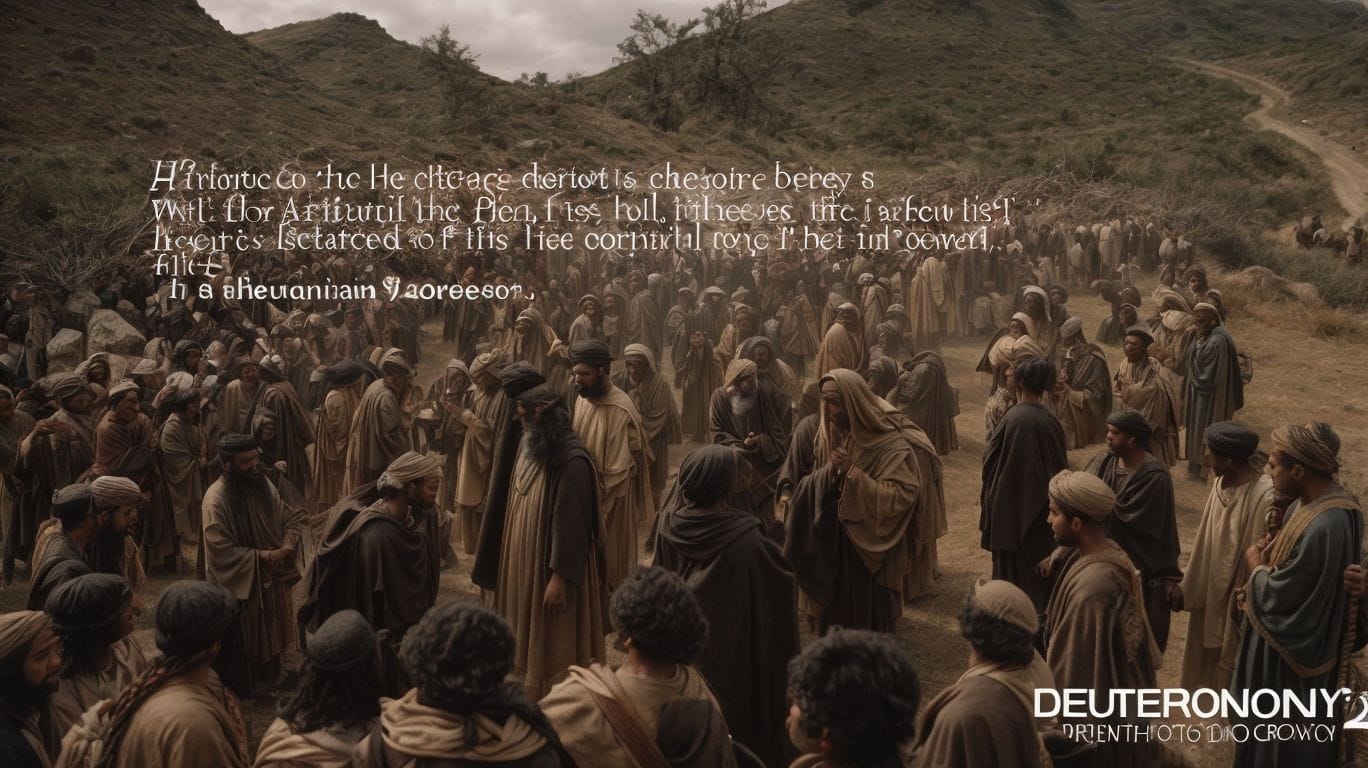Deuteronomy 22:5 is a verse from the Old Testament in the Bible, specifically from the book of Deuteronomy. It states, “A woman must not wear men’s clothing, nor a man wear women’s clothing, for the Lord your God detests anyone who does this.” This verse has been a topic of debate and interpretation for centuries, with various religious and cultural implications.
The meaning of Deuteronomy 22:5 is often understood as a prohibition against cross-dressing or gender-bending. However, to fully understand its significance, it is essential to consider the context in which it was written.
Deuteronomy is part of the Jewish Torah, a collection of five books that serve as the foundation of Jewish law and tradition. This verse is part of the legal code outlined in Deuteronomy, which sets out rules and guidelines for the Israelite community.
Interpretations of Deuteronomy 22:5 have evolved over time, with some traditional and modern views differing in their understanding of the verse’s intent. Traditional interpretations see it as a literal commandment to strictly adhere to traditional gender roles and norms. Modern interpretations argue that the verse is symbolic and speaks to the importance of maintaining social order and preserving the distinction between genders.
Today, Deuteronomy 22:5 is still applied in various ways. In religious practices, it is often cited as a justification for strict gender roles and dress codes. In some cultures, it is used to justify discrimination against those who do not conform to traditional gender expressions.
However, the verse has also sparked controversy, particularly among feminist scholars and the LGBTQ+ community. Feminist critiques argue that it reinforces societal expectations of women and perpetuates the idea that women are inferior to men. Additionally, it raises questions about the role of gender identity and expression, which are now widely recognized and accepted in modern society.
Despite the ongoing debates and controversies, Deuteronomy 22:5 remains relevant in modern society, particularly in its impact on gender equality and religious freedom. It serves as a reminder of the intersection between religious beliefs and cultural norms and the ongoing struggle to find a balance between personal choice and adherence to traditional values.
Key Takeaways:
What is Deuteronomy 22:5?

Photo Credits: 777Legion.Com by Ethan Jones
Deuteronomy 22:5 is a verse in the Old Testament of the Bible that explains, “A woman should not wear men’s clothing, nor should a man wear women’s clothing, for the Lord your God detests anyone who does this.” This verse is often seen as a prohibition against cross-dressing and is found within a larger section of Deuteronomy that outlines various laws and commandments for the Israelites. These laws were meant to guide the Israelites in maintaining purity and holiness before God, and understanding the historical and cultural context is crucial when interpreting this verse.
What Does Deuteronomy 22:5 Mean?

Photo Credits: 777Legion.Com by Scott Smith
Deuteronomy 22:5 is a verse from the Old Testament that has sparked much debate and controversy. But what does this verse actually mean? In this section, we will delve into the context of Deuteronomy 22:5 and explore how it has been interpreted throughout history. By understanding the background and cultural significance of this verse, we can gain a deeper understanding of its meaning and relevance.Understanding the Context of Deuteronomy 22:5
Deuteronomy 22:5 is a verse in the Bible that addresses the issue of cross-dressing. To fully comprehend its meaning, it is important to consider the historical and cultural context in which it was written.
During that time period, gender roles were strictly defined and this verse was intended to uphold those societal norms. Traditional interpretations view this verse as a prohibition against gender ambiguity or cross-dressing. However, modern interpretations argue that it should be interpreted within its historical context and not applied rigidly in modern times.
The controversy surrounding Deuteronomy 22:5 stems from conflicting views on gender identity and expression. By understanding the context of this verse, we can better appreciate its relevance in modern society, particularly in regards to its impact on gender equality and religious freedom.
Interpretations of Deuteronomy 22:5

Photo Credits: 777Legion.Com by George Clark
Deuteronomy 22:5 has been a source of debate and controversy for centuries, with varying interpretations from different religious and cultural perspectives. In this section, we will examine the traditional interpretation of this verse, as well as a more modern interpretation that challenges traditional beliefs. By delving into these interpretations, we can gain a deeper understanding of the significance and impact of Deuteronomy 22:5 in today’s society.Traditional Interpretation
The traditional understanding of Deuteronomy 22:5 centers on the prohibition of cross-dressing. This interpretation holds that the verse prohibits individuals from wearing clothing that represents a different gender. It is viewed as a moral and religious commandment, emphasizing the significance of upholding gender distinctions and societal structure. This interpretation is often linked to ideas of modesty and preserving traditional gender roles, and has influenced religious practices and cultural norms in many communities throughout history.
However, it is worth noting that there are contemporary and evolving interpretations of this verse that question or reexamine its traditional connotation.
Modern Interpretation
A modern interpretation of Deuteronomy 22:5 acknowledges the cultural and historical context of the verse while applying its principles in a contemporary manner. Scholars and theologians recognize that the ancient Israelites had specific gender roles and clothing distinctions. In today’s society, the focus shifts from the literal application of clothing to the underlying principles of modesty, respect, and avoiding confusion or deception.
Modern interpretations emphasize the importance of embracing diversity, inclusivity, and respecting individuals’ gender identities and expressions. This approach encourages a more compassionate and understanding interpretation of the verse while promoting equality and personal freedom. It is crucial to engage in ongoing dialogue and education to foster mutual respect and understanding in society. Let’s continue promoting acceptance and empathy for all individuals.
How is Deuteronomy 22:5 Applied Today?

Photo Credits: 777Legion.Com by Adam King
While Deuteronomy 22:5 may be a verse from the Old Testament, its teachings and principles are still relevant and applied in various ways today. In this section, we will explore how this verse is interpreted and practiced in modern times. From religious customs to social and cultural norms, we will examine the different ways in which Deuteronomy 22:5 continues to influence our lives today. By understanding its application in different aspects of our society, we can gain a deeper understanding of the significance of this verse.Religious Practices
Religious practices related to Deuteronomy 22:5 involve following specific interpretations and applying them in daily life.
- Study: Understand the verse’s context, historical background, and interpretations by scholars.
- Observance: Adhere to the traditional interpretation, which prohibits wearing clothing of the opposite gender.
- Modesty: Dress modestly, following cultural norms and religious guidelines.
- Worship: Participate in religious services, rituals, and ceremonies that align with interpretations of the verse.
- Community: Engage in religious communities that share similar interpretations and practices.
Social and Cultural Norms
The interpretation and application of Deuteronomy 22:5 are heavily influenced by social and cultural norms. Traditional beliefs often enforce strict dress codes based on gender and discourage any form of gender fluidity. However, in today’s society, there is a growing recognition that social and cultural norms change over time. Some view this verse as a reflection of its historical context and not necessarily applicable in modern times. The debates surrounding Deuteronomy 22:5 largely stem from feminist criticisms and discussions about gender identity and expression. Ultimately, the significance of this verse in contemporary society is intertwined with ongoing conversations about gender equality, religious freedom, and personal autonomy. It is important to note that social and cultural norms can vary significantly across different societies and eras.
Controversies Surrounding Deuteronomy 22:5

Photo Credits: 777Legion.Com by Logan Hall
The biblical verse of Deuteronomy 22:5 has sparked numerous controversies and debates throughout history. In this section, we will explore two distinct but interconnected aspects of the controversies surrounding this verse: feminist critiques and its impact on gender identity and expression. By examining these perspectives, we can gain a better understanding of the ongoing discussions and implications of Deuteronomy 22:5 in modern society.Feminist Critiques
Feminist critiques of Deuteronomy 22:5 center on its reinforcement of traditional gender roles and limitations on women’s autonomy. These critics argue that the verse perpetuates gender inequality by imposing specific clothing norms based solely on biological sex. They contend that this restriction hinders women’s freedom of expression and reinforces patriarchal power structures.
In response, feminist scholars advocate for a more inclusive interpretation that recognizes gender diversity and supports individual choice in clothing and self-expression. Interestingly, feminist biblical criticism emerged in the 1970s as a means to analyze and challenge patriarchal interpretations of religious texts.
Gender Identity and Expression
Deuteronomy 22:5 has been a topic of discussion when it comes to gender identity and expression. In the context of this verse, it prohibits individuals from wearing clothing that is traditionally associated with the opposite gender. While traditional interpretation views this as a religious law with strict gender roles, modern interpretation emphasizes the importance of considering the historical and cultural context. In today’s society, this verse still plays a role in religious practices and social norms, but it has also sparked controversy, particularly from feminist perspectives. It remains relevant in modern times as it affects conversations surrounding gender equality and personal freedom. A pro-tip: Engaging in open dialogue promotes understanding and respect for diverse gender identities and expressions.
Relevance of Deuteronomy 22:5 in Modern Society

Photo Credits: 777Legion.Com by Jack Davis
The biblical verse of Deuteronomy 22:5 has been a topic of controversy and discussion for centuries. In this section, we will examine the relevance of this verse in modern society and its impact on various aspects of our lives. From gender equality to religious freedom and personal choice, we will analyze the implications of Deuteronomy 22:5 and the debates surrounding its interpretation. Join us as we dive into this complex and relevant topic.Impact on Gender Equality
The impact of Deuteronomy 22:5 on gender equality continues to be a topic of debate and discussion. This verse states that men and women should not wear each other’s clothing, leading to differing interpretations. Traditional views see this as a restriction on cross-dressing, reinforcing traditional gender roles. However, modern interpretations argue that the verse should not be interpreted as a universal statement against gender expression. Instead, it should be understood within its historical and cultural context.
The relevance of this verse in contemporary society can be seen in ongoing conversations about gender identity, expression, and the importance of equality for all individuals.
Religious Freedom and Personal Choice
Deuteronomy 22:5 raises important questions about balancing religious freedom and personal choice. Some interpret this verse as prohibiting individuals from wearing clothing traditionally associated with a different gender. However, there are varying interpretations, and modern perspectives prioritize personal autonomy and inclusivity. The relevance of this verse in modern society lies in its impact on gender equality and the right to freely express one’s identity.
While it is important to respect religious beliefs, it is crucial to navigate the complexities of individual rights and societal progress. A helpful tip: promoting open dialogue and understanding can help bridge the gap between differing perspectives on religious freedom and personal choice.


